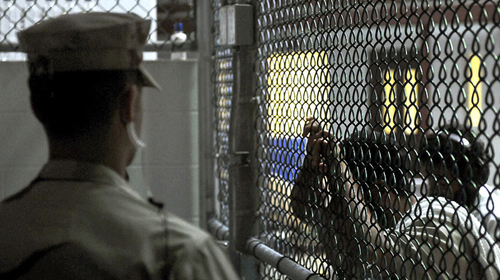3 Reasons the Guantánamo Military Commissions Need the Senate Torture Report


On August 1, President Obama acknowledged again that "." Last week, one of those people, Abd al-Rahim Hussayn al-Nashiri, was back in the courtroom in the Guantánamo military commissions, where he faces the death penalty for his alleged role in the bombing of the USS Cole.
While the CIA's torture program is now shuttered, its consequences still reverberate in Washington and at the commissions. As the CIA and the Senate Intelligence Committee fight over the spy agency's redactions to the Senate torture report summary, here are three key ways in which release of information in the report could impact the transparency and fairness of al-Nashiri's military commission trial.
- Defense lawyers, the judge, and the public may get a more complete picture of the CIA's torture of al-Nashiri and its impact on him and his case.
Currently, the government claims that details of al-Nashiri's torture are classified. This means the government seeks to limit the information his defense lawyers may obtain, share with their client, and submit to the judge in adversarial briefing on matters that could help determine whether al-Nashiri lives or dies. The government's classification claims also severely limit what information becomes public about the CIA's torture of al-Nashiri and its impact on him.
For example, although a judge in this case previously ordered the prosecution to provide defense counsel detailed information about al-Nashiri's treatment in CIA black sites, the prosecution wants to provide its own summaries of that information rather than original documents, which are the best evidence of what happened. Public release of detailed information in the Senate report would mean justifications for government-created summaries might fall away, defense lawyers could more effectively represent their client, and the commission trials would be more transparent.
Relatedly, release of the Senate report could mean that witnesses would be able to testify more fully about torture and its impact. In April, defense expert Dr. Sondra Crosby's testimony was considerably hobbled during a hearing on whether the case should be halted until al-Nashiri gets medical treatment. Crosby testified that al-Nashiri was subjected to physical, psychological, and sexual torture that caused chronic post-traumatic stress disorder. But she couldn't say anything about the specific instances of abuse that caused his mental trauma because that's classified, leaving Col. Vance Spath, a judge newly appointed to the case, with potentially incomplete facts upon which to base his ruling.
The release of the Senate report could change all of this and put crucial information in front of Judge Spath, the members of the military commission panel who will ultimately decide al-Nashiri's fate, and the public.
- Statements that may be the fruit of coercion are less likely to be admitted as evidence.
The prosecution has indicated that it will seek to use at trial statements al-Nashiri made to interrogators after he was brought to Guantánamo. Presumably, under the prosecution's view, the CIA's torture of al-Nashiri had stopped by then, so these statements aren't barred as impermissible coerced evidence. The information in the torture report may further detail, however, the extent and cruelty of the CIA's torture. It could strengthen his defense counsel's likely argument that the government's conduct was so outrageous – and had such a long-lasting effect – that all of al-Nashiri's statements must be excluded from trial.
- Al-Nashiri may get medical care for the consequences of torture.
The defense has asked Judge Spath to stop the proceedings until al-Nashiri obtains treatment for PTSD, and it has also asked for an MRI to determine if he sustained a traumatic brain injury from torture. The prosecution opposes both requests. While Judge Spath could rule without further evidence, the narrative of torture in the Senate torture report would surely frame public perception of the government's arguments and the judge's rulings. With more information in the public domain, the government would likely have a harder time arguing against additional diagnosis and medical care for the consequences of the torture to which it subjected this capital defendant.
There's an old adage about justice – it not only has to be done; it has to be seen to be done. While there are still multiple defects in the commission system, there can be no justice, or anything remotely approximating it, if crucial, devastating elements of al-Nashiri's story remain secret. Prompt release of the Senate torture report would help serve justice.
Learn more about military commissions and other civil liberties issues: Sign up for breaking news alerts, , and .

